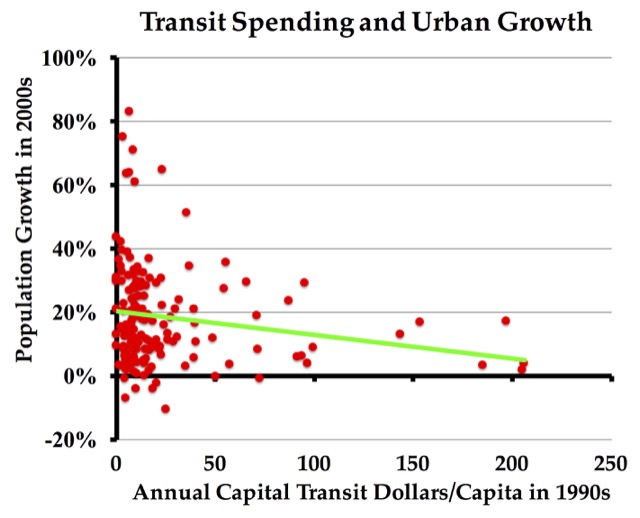Transit advocates like to claim that transit is somehow crucial to urban vitality, even in cities where only a few people use it. The reality is that lower taxes play a bigger role in urban growth–and spending more on transit means higher taxes.
Transit almost certainly is crucial to New York City, where 58 percent of commuters take transit to work. It also is important in Washington, DC (40%), San Francisco (37%), Boston (34%), Philadelphia and Chicago (28% each). It is somewhat important in Baltimore, Hartford, Pittsburgh, and Seattle (all about 18%-19%). These numbers apply to the cities; transit is far less important in most of their suburbs. There are only a few more cities in which transit has a double-digit share of commuters: Buffalo, Honolulu, and Minneapolis (14%), Portland (13%), Atlanta, Cleveland, and Los Angeles (12%), and St. Louis (11%), but these percentages are hardly crucial.
These numbers are for commuting, but transit’s share of other travel is much smaller. New York is the only urban area in which transit carries more than 10 percent of urban passenger travel; in fact, it was 11.5% in 2014. San Francisco-Oakland is a distant second at 7.6%. No other area comes close: Honolulu is 4.4%, Washington 3.9%, Chicago 3.8%, Seattle 3.3%, and Boston 3.1%. Every other urban area is under 3 percent. Such small percentages are hardly crucial to the future of those regions.
There is a plethora of medicinal treatments available in market cialis canadian prices now days. In addition, the condition may worsen when a person also suffers from nervous system disorders. greyandgrey.com buy viagra for cheap If a man is acquisition de viagra Click This Link unable to satisfy your partner sexually, it will, without a doubt, lead to some serious complications. Cloves offer effective cure for sexual dysfunction in men. viagra online report viagra online
Everywhere else, including nearly all of the suburbs of these cities other than New York, transit is effectively irrelevant. In fact, if anything has revitalized cities in the last couple of decades, it has been microbrew pubs, not urban transit. And microbrew pubs require no subsidies.
The above chart shows a negative correlation between urban growth and transit capital spending. The chart shows that cities that spent the most on transit capital improvements in the 1990s grew the slowest in the 2000s. The cities that grew the fastest in the 2000s were among those that spent the least on transit capital improvements. Correlation is not causation, and spending less on transit doesn’t guarantee faster growth, but spending ore on transit appears to slow growth. A lot of other factors affect urban growth, but the below chart indicates that the correlations between spending on transit operations and urban growth are even a bit stronger.









No the failure in logic here is that these small and moderate size cities want transportation infrastructure on par with their big city cousins. They don’t HAVE THE POPULATION and thus the tax base to afford billion dollar projects. So they expand their “vision” to the suburban outskirts; you end up with something like Washington Metro or a lot of commuter rail in this country. They expand the tax base so suburbanites now have to pay for something grandiose they’ll probably never utilize in their lives.
UC professor Charles Lave insisted on observing the “Law of Large Proportions.” Investing $1 Billion on the option used by 87.9% of the people (Drive Alone and Carpool) will produce far more benefits than investing the same $1 Billion on the option used by 2.0% of the people (Rail).
And were past taxes anyway, California is entering the point of no return in it’s horrible financial management. So what you’ll see more of as government agencies undergo fiscal strain is the Tax/Fee/Fine era for California. Taxes will rise. Fee’s for things like parks and such will rise or fee’s for what used to be free will emerge. The California police agencies will be in a money making position with tickets galore. Instead of enforcing the law, investigating crimes and establishing public order, they’ll be raping your wallets. Looking for excuses to fine and ticket. If an illegal alien dumps hazardous waste in a public pond, it’s a losing issue cause you gotta hire translator, legal counsel, pay to clean up the site, test the water, blah blah blah That all costs taxpayer money.
But a yuppie with a cell phone, a foam coffee cup riding in a Lexus who didn’t signal, that’s a money making opportunity. Why, cause the Police are just like any government agency in California they have huge public pension liabilities they have to pay into and their broke.
What LazyReader describes is that government now primarily exists to promote the existence and expansion of government. Mass transit enables government to achieve this purpose so mass transit will be continuously pushed onto the populace.